Get in touch with our friendly woodland creation team.
By email: plant@woodlandtrust.org.uk
By phone: 0330 333 5303
Increase river health, fight climate change and boost biodiversity.
River woodland sits alongside rivers, streams, lochs and other watercourses. These wonderful woods have a host of benefits that can help us tackle the climate and biodiversity crises. But, as with all woods, we need more of them.
To do that, we need you. We're supporting you to plant river woodland on your land - a delicate balance involving the right trees in the right place, and the right resources. With our help, your new trees can:
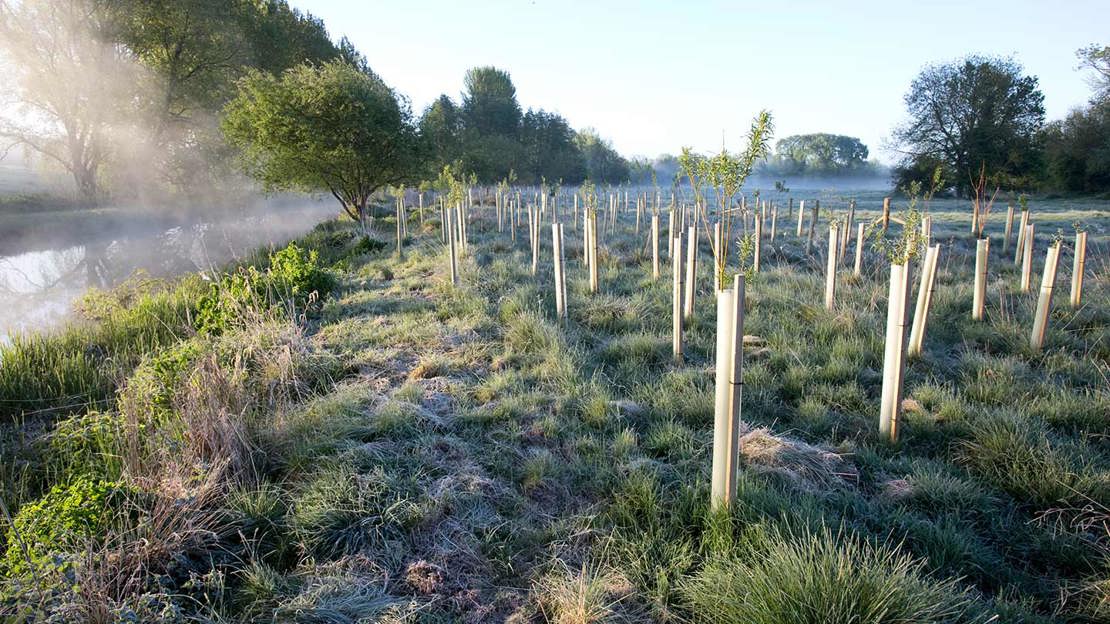
Also known as riparian woodland, it is commonly found on steep banks which are difficult to access. It can often remain untouched by man - forming a vital wildlife corridor in areas that may have seen the loss or degradation of trees and woodland.
Our team of experts located across the UK can advise on planning (helping you plant the right tree in the right place), as well as funding watercourse planting and restoration. You may be able to take advantage of our MOREwoods scheme, and there are specific country and regional grants available too.
Planting and restoring woodland alongside rivers and watercourses brings many benefits, including:

Your trees won't just lock up carbon - they'll stabilise the riverbank and reduce the effects of flooding.

Trees alongside rivers and watercourses join up disconnected habitats, giving wildlife room to recover.

You may be eligible for funding or grants and we'll be here to help, from planning to planting.
Get in touch with our friendly woodland creation team.
By email: plant@woodlandtrust.org.uk
By phone: 0330 333 5303
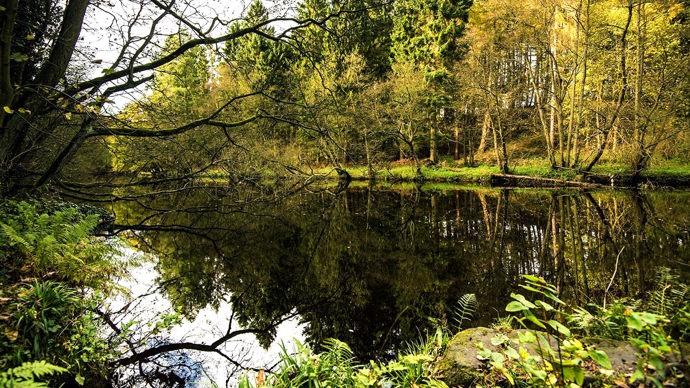
Credit: Jill Jennings / WTML
Trees next to rivers cast shade over the water, which regulates the river temperature and nutrient levels. This helps to prevent algal blooms and keeps the aquatic ecosystem in balance.
River woodland can also improve water quality by helping to reduce pollutant and pesticide run-off from agricultural activities.
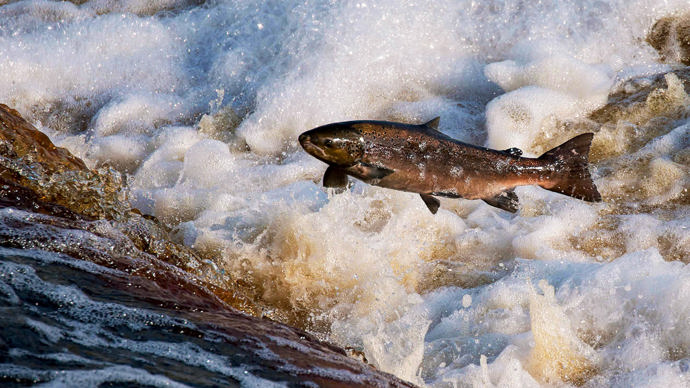
Credit: Ann and Steve Toon / Alamy Stock Photo
Shade, fallen trees left in rivers, and tree debris (like submerged branches and leaves) give fish safe places to shelter and spawn. River woodlands help keep river systems healthy and stop water temperatures from reaching lethal limits, which can be catastrophic for our dwindling fish populations - particularly Atlantic salmon which depend on clean, cold water.
Find out more about the threats facing salmon in the Riverwoods documentary by Scotland: The Big Picture.
>> Narrator: Despite the obvious beauty and drama of Scotland's rivers, there's a devastating secret hidden within.
>> Russ: I'm fishing for salmon, the king of fish. 10 years ago I might have stood in this exact spot and caught 10 fish. Today I'll be lucky to hook one. Scotland’s rivers and the fish that swim in them are under threat.
>> Narrator: These hills and glens were once a mosaic of complex woodland, open glades and boggy pools. Now, after centuries of change in land use, they are largely bare. Without the trees to shade the water, Scotland's rivers are getting warmer. While this might be good for one species, it's definitely not good for this one. Salmon thrive in clean, cold water. As our climate changes, the impact of whole river catchments devoid of trees could be devastating for these fish that are so symbolic of our pristine, cascading rivers. Already, fish are dying in some upland water courses. But things are changing. The Woodland Trust is working across many river catchments to expand native woodlands alongside rivers and burns. These trees will not only provide shade and provide cover for young salmon and trout, they will stabilise the banks, slow the flow of water downstream and create wildlife corridors, improving connections between fragmented islands of forest, benefiting a host of other species. Expanding and connecting our woodlands sets a whole range of dynamic natural processes in motion. Riverside trees are home to thousands of insects, many of which fall into the water, providing food for fish and birds. In autumn, when the trees shed their leaves, they enrich the water with valuable nutrients. Salmon are not only an essential element of Scotland's rivers, they actually feed the forest. Many salmon die after spawning and once scavengers have had their fill this natural fertiliser nourishes the soil, which in turn feeds the trees. The king of fish is not only the ultimate angler's prize, but a key building block in a complex living system and all its supports.
>> Russ: The salmon need the forest, and the forest needs the salmon.
>> Narrator: Scientists tell us that unless we act, salmon could disappear from Scotland's rivers in 20 years. The Woodland Trust works alongside Rivers Trusts and other conservation groups to enhance and expand riparian woodland, and landowners are the key to the whole process. There are sometimes competing land uses and compromises have to be made on all sides. But ultimately, we are all working towards the same goal to return an abundance of life to Scotland's rivers by revitalising the landscapes through which they flow.
>> Russ: We've already helped establish vital ecological corridors alongside rivers and watercourses, and by working with landowners to get the right trees in the right place for the right reason, we can do much more.
>> Narrator: We want to see more of our hillside wooded, to store carbon, reduce flood risk and provide a home for wildlife. Return life to Scotland's rivers. Plant trees.
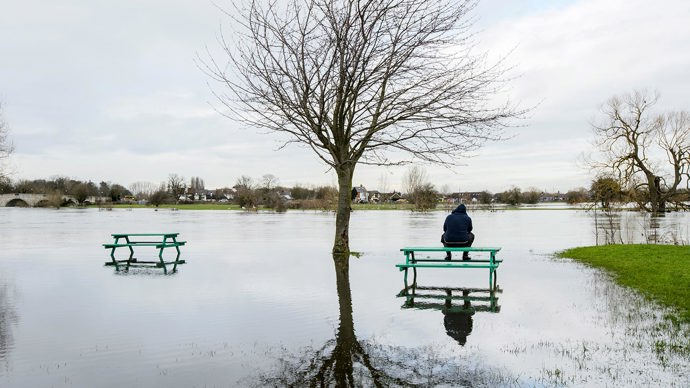
Credit: Terry Whittaker / Alamy Stock Photo
River woods intercept falling rain with their canopy, help water seep deeply into the soil with their roots, and slow the flow of river water with their trunks and deadwood.
Climate change, and a natural landscape in desperate need of restoration are increasing flooding in the UK. Explore how trees help reduce flooding.
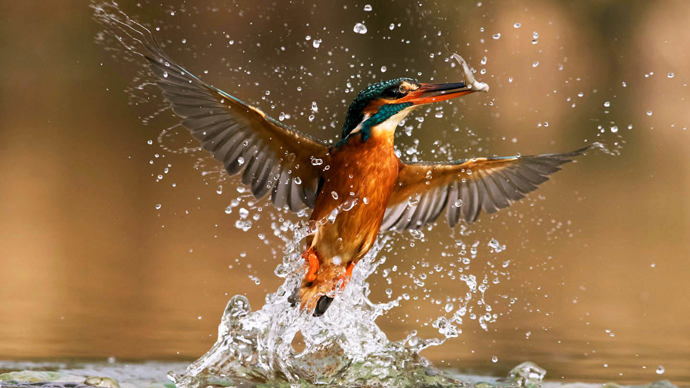
Credit: Jerome Murray CC / Alamy Stock Photo
Planting woodland by rivers is essential for the health of our planet. It offers food for birds, bats, fish and invertebrates, and provides nutrients that fuel river life.
River woodland also locks up carbon in the vegetation and soil, prevents erosion and stabilises the riverbank. It creates wildlife corridors that connect habitats up and downstream, and gives people a place to enjoy being surrounded by nature.
We're playing our part in the recovery of the UK's rivers by also restoring its trees.
Woodland Trust Scotland is a partner in the Riverwoods Blueprint Project, a £3.5 million project supported by the National Lottery Heritage Fund, thanks to National Lottery players and others. It sits at the core of Riverwoods' partnership activities and aims to develop a practical blueprint for river woodland restoration and creation across Scotland. By working in partnership, we can plant and restore more river woodland than we could alone. We can also pool our knowledge, support more landowners with practical work, survey sites and analyse our findings in detail.
We're part of the Woodlands for Water project, developed by the Riverscapes partnership, which aims to plant more than 3,000 hectares of trees in six river catchment areas from Devon to Cumbria by March 2025.
We’ve teamed up with Natural Resources Wales as part of the the Four Rivers for LIFE project. This partnership will protect, enhance and restore around 500 kilometres of river in South Wales over five years, including planting 55,000 native broadleaved trees.
We're working with the Loughs Agency to create 12 wet woods designed to reduce water run-off and pollution from local farms. The Wet Woods project will work with farmers along the Faughan River to restore more intensively farmed land: helping their farms adapt to climate change, improving water quality, helping wildlife thrive and connecting fragmented woodlands along the riverbank. We'll also create ponds to hold gallons of water as a resource for both the farms and the 120,000 trees planted.
Our team can help you create river woodland on your land. Email plant@woodlandtrust.org.uk for more information.